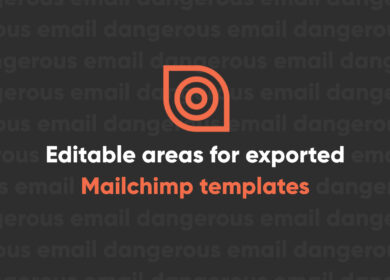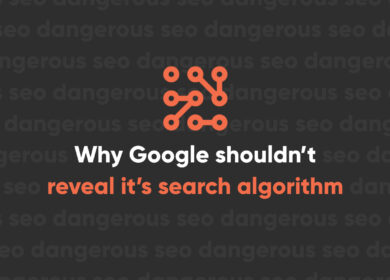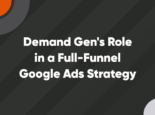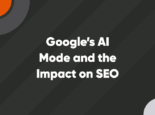
A Marketer’s Guide to AI-Powered Search

This blog was originally posted in February 2023 and was last updated in May 2025 to reflect the latest AI technological advancements.
Since the start of 2023, new AI technology has taken the digital space by storm, resulting in a little chaos and a lot of confusion on where to focus marketing efforts.
Over the last couple of years, Google has introduced AI Overviews search results, Microsoft has implemented similar functionality in Bing, ChatGPT released its own search engine, and other AI tools like Perplexity and Claude are frequently being used for brand search and discovery. These advancements in AI technology and updates to search engines are majorly impacting how people search, and in turn, how marketers can leverage SEO and AI tools to enhance their marketing efforts.
Let's break down these AI-powered search updates and examine how SEO specialists can continue to prioritize content with these changes.
AI is changing the way we search
AI tools like ChatGPT and AI Overviews are changing the way we search. Large language models are introducing an entirely new way of searching and receiving information online.
When AI-powered search first started ramping up back in 2023, Microsoft shared some interesting facts about how the way people search positions AI as a solution:
- There are 10 billion search queries a day, but Microsoft estimates that half of them go unanswered because people are using search in ways it was never originally intended
- 40% of queries result in someone clicking back to the SERPs
- Most searches are 3 keywords or fewer
- 50,0000 searches go unanswered
These statistics demonstrated the opportunity AI had to upend the search landscape. And now in 2025, 61% of Gen Z users and 53% of millennial users say they prefer AI tools to Google Search, and ChatGPT sees over 37.5 million daily searches. AI search solutions align with how people prefer to search, which is reflected in more and more users turning to AI to search for information, products, services, and brands.
Get to know AI-powered search
When we refer to AI-powered search, we’re referring to any tools powered by AI that users are turning to for sourcing information.
Within search engines, this could include AI Overviews or Bing Chat, which let you access AI-generated answers directly within Google and Bing search results pages. These answers appear alongside traditional search engine results, like paid and organic listings, local listings, etc.
AI-generated answers provide quick, featured snippet-style results that answer the users’ queries using a culmination of sites on the internet. Many of these results answer the users’ query well enough that they don’t have to click into a traditional organic result, which is increasing the number of zero-click searches—but more on that later.
Also included in AI-powered search are chatbots like ChatGPT, Claude AI, Perplexity, and Gemini. These platforms exist outside of traditional search engines and tend to cultivate more conversational searches, which is a major deviation from how users search on traditional search engines.
Expanding beyond search engines
ChatGPT, Perplexity, and other AI platforms have come out with their own standalone search engines that serve as alternatives to traditional search engines. These tools deliver results that are highly personalized, conversational, and very relevant to the user. They can develop into longer, ongoing conversations that include context-rich answers.
Search behavior trends
One thing to note through all of this is that users aren’t turning to just one go-to search platform anymore. Gone are the days of relying solely on Google for answers. Instead, different search platforms have different uses. Google and traditional search engines are still popular for transactional and location-based queries. But for longer, more complex questions, specific insights, research, and more, AI is becoming more and more popular. The stored memory of LLMs and the way they’re able to deeply personalize answers make them not only useful but also more relevant and enjoyable to use. Moving forward, SEOs need to have a strategy for showing up in generative engine results as well as in traditional search results.
The impact of AI-powered search on SEO
Now that we’ve debriefed on how users are utilizing AI tools to search, let’s dig into how these new search tools will impact your website traffic and how the SEO role may change.
The growth of AI as a search behavior is one of the biggest changes to how users search for information that we’ve seen in years, and it's only natural to wonder how these changes will alter how users search for things and how that impacts website ranking. Is SEO even relevant anymore?
Short answer, yes, it is. And while these changes are a pretty big deal, traditional SEO is still important, and plenty of users are still using traditional search engines to discover new products and businesses. Organic search is still driving plenty of traffic, clicks, and conversions. So don’t back off your SEO strategy. But do consider how to grow your search strategy to include AI channels.
Here are some of the key changes we’re seeing in the SEO industry:
AI responses are taking more SERP real estate
Gone are the days of ranking at the top of the page in Google Search results. Instead, increasingly more pages feature AI Overviews, which take up a substantial amount of room on the first page. And then underneath that, Google Ads listings show up, leaving minimal space for organic website listings.
Even though there are fewer places to show up, focusing on traditional SEO is still crucial for brand visibility. Google’s AI Overviews tend to rank content that’s helpful, thorough, unique, visual, and straightforward. Your content will be more likely to get featured if you can fully answer the query in a way that’s easy for an LLM to break down.
Lost traffic for one-off questions
With the launch of featured snippets, some sites experienced a loss of traffic from users who could now get the answers to their questions without even clicking on a website. This is happening again with AI-generated search results. If a user asks a standard question that requires a simple response, users will probably take that response and end their search.
That won't always be true, though, which is why SEOs should continue to prioritize ranking for long-tail keywords that require a more detailed response. AI might not be able to give a full answer, and users may venture to a trusted website instead. And even if the AI does give a complete answer, it should cite its sources, which could include website links.
Zero-click searches are increasingly common
It's highly likely that with an AI bot generating responses to queries and getting trained to interpret what exactly a user is looking for, users will get more of their questions answered directly in the AI answer box and won't need to click on a search result to learn more.
There will likely be many more changes to search as AI progresses, but as people adjust to having the option to use AI in search, search engines will work to make it as seamless as possible to keep users happy. People will still need traditional search to fact-check AI, conduct their own research, and get answers to navigational and informational queries, so traditional SEO practices will remain important. Continuing to create helpful, relevant content that appeals to both people and search engines is the best response to these AI updates.
The introduction of Generative Engine Optimization (GEO)
The optimizations required for showing up in gen AI search results differ from what’s needed for traditional search engines, which requires a different practice altogether: generative engine optimization, or GEO.
GEO refers to the practices used for increasing visibility in generative search engines like ChatGPT, Perplexity, and even AI Overviews. While important, GEO isn’t a replacement for SEO. The two should work together to give your brand maximum visibility across digital channels, including both traditional search and generative search.
Where to focus your SEO and GEO efforts
With all of these changes taking place and the future of search being relatively uncertain, where should SEO specialists be spending their time?
Great question! A lot of the things SEOs have been prioritizing should remain a priority, like creating helpful content and optimizing on-page SEO aspects of your content. But there are a few notable areas that we think you might want to pay extra attention to.
And with the rise in generative search, it’s important to measure traffic from generative search, incorporate generative engine optimization (GEO) into your digital strategy, and fully optimize your website to show up in gen AI results.
Here are our tips for how to strengthen both your SEO and GEO strategies.
Spend time on local SEO
Local SEO and the map pack on Google are still going strong and likely always will, regardless of AI's integration with Google. This set of the top three local businesses is a great place for your business to get discovered and to pull in more traffic.
While AI results appear above local pack results in SERPs, one does not have to come at the expense of the other. Local results that are verified and well-loved, based on top reviews and current standings in Google's traditional search results, will feed both result types.
Optimizing your Google Business Profile
Google Business Profiles are not just for local businesses anymore. Every business should have a Google Business Profile—even if you don’t want customers to visit you at your business. Be sure to keep key business information, like services offered, contact details, and other offers, up to date.
Stick to producing quality content that aligns with your expertise
As Google works to make its search results better for users and incorporates this new technology, it's important to remember that high-quality, relevant content will still win out no matter how the SERPs look. Whether AI is referencing your web page in a response or your site is ranking just below the AI-generated answer, your content should reflect your business's expertise, demonstrate your overall knowledge of the topic, and provide new and valuable information to your target audience.
Wondering what types of content to create? Articles/blog posts, pages that provide helpful and relevant information to users, images, reviews, and videos can all help you win in search.
Focus on adding a human perspective to your content
An aspect that AI can't provide is anecdotal stories and firsthand experiences. And when you're researching a topic or learning about something, nothing beats hearing about someone's own unique journey and challenges.
This type of impactful, raw content will be impossible for AI to create because it simply can't experience what humans can. Keep this in mind as you craft content. The content we're creating is for humans, so make sure to include those stories. Search algorithms will reward that type of content because it's something AI cannot provide.
Keep content conversational
Users tend to search on AI tools in a more conversational way than they would on traditional search engines, so keeping a conversational tone could help your content show up in more AI search results. Focusing on long-tail keywords will naturally help you show up in AI results too, as these keywords are ones that typically allow for deeper, more specific insights.
Natural language processing and content
LLMs are increasingly trained to understand how humans have conversations. If your content is poised to answer multipart questions or compound questions, your content is better positioned to show up in LLM answers.
Wondering what a multi-part question is?
Think questions that contain qualifiers or additional details that require more complex answers, like “What’s the best pharmacy software for independent pharmacies that also keeps track of inventory and helps us plan customer deliveries?”
Leverage schema
Schema categorizes your content and gives context on the relationship of your content compared with other content on your site. Adding schema markup is a long-standing SEO practice that helps search engines understand your content, and it’s also used by LLMs to get further context into your website. That added context can help your business show up in more LLM mentions, and in turn, drive more traffic and conversions.
Strengthen your digital presence with Perrill
In this new era of AI-powered internet, staying true to your SEO roots while expanding your strategy to include generative engines will be key to getting the most traffic to your site. This space will continue to change rapidly, so it’s important to have a plan of attack for showing up online.
Perrill is a digital marketing agency that specializes in generative engine optimization services, SEO, marketing, and website design and development. We've got our finger on the pulse and can power your business to win online. If you're ready to upgrade your digital marketing strategy to grow your online presence, reach out.

Grace Hallen
Join Our Newsletter


Why Google Shouldn’t Reveal Its Search Algorithm


8 Signs You Need a Website Redesign


